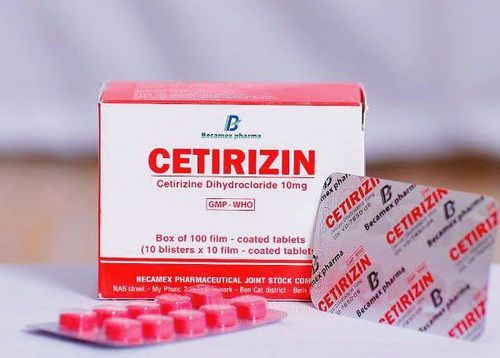This is an automatically translated article.
Betaphenin belongs to the group of antiallergic drugs and is used in cases of hypersensitivity. The drug is in the form of tablets, packed in boxes of 2 blisters x 15 tablets. Before using Betaphenin, patients should consult with their doctor for advice and instructions. Here are some information to help you understand what Betaphenin drug does? Dosage like?
1. Uses and indications of Betaphenin
Betaphenin medicine contains the main ingredients Betamethasone and Dexchlorpheniramine maleate. The drug is indicated for the treatment of:
Allergic rhinitis; Hives; Chronic bronchial asthma ; Allergic lymphadenitis; Anaphylactic reactions to the drug; Allergic dermatitis ; Indigo ; Contact dermatitis ; Allergic conjunctivitis.
2. Contraindications of Betaphenin
Betaphenin is contraindicated in the following cases:
People are sensitive to any component of Betaphenin drug; Patients with systemic fungal infections; Infant; Premature babies; People who are taking MAOIs. Have diabetes, peptic ulcer caused by bacteria or virus, mental illness.
3. Dosage and how to use Betaphenin
How to use: Betaphenin drug is taken orally.
Dosage:
For adults and children > 15 years old: Take 1-2 tablets x 3-4 times/day. Children from 8-14 years old: The starting dose of Betaphenin is 1⁄2 - 1 tablet x 3-4 times/day. Children from 3 to 7 years old: The starting dose is 1⁄4 - 1⁄2 tablets x 2-3 times/day. Then use the lowest effective maintenance betaphenin dose. Note: Betaphenin dosage above is for reference only. The specific dose of Betaphenin depends on the condition and the progression of the disease. To get the right dose of Betaphenin, patients should consult their doctor or healthcare professional.
How to handle when you miss a dose, overdose of Betaphenin:
In case you forget a dose of Betaphenin, you should make up for it as soon as possible. However, if it is almost time for the next dose, skip the missed dose of Betaphenin and use a new dose. When using an overdose of Betaphenin, the patient should stop the drug immediately and go to the nearest medical facility for timely treatment.
4. Betaphenin drug interactions
Betaphenin may have an interaction reaction when combined with:
Phenobarbital; Phenytoin drug ; Rifampin drug; Ephedrine; Potassium-depleting diuretics; Cardiac glycosides; Anticoagulants of the coumarin type; Non-steroidal anti-inflammatory drugs; Dexchlorpheniramine maleate interacts with MAOIs; Other antihistamines; Tricyclic antidepressants; Barbiturates. To avoid interactions, before being prescribed Betaphenin, the patient should inform the doctor about the drugs they are using, including functional foods. The doctor will base on that to prescribe the appropriate Betaphenin.
5. Betaphenin side effects
Betaphenin drugs have a high level of safety and few unwanted side effects. However, using Betaphenin in high doses or for a long time, can cause unwanted effects such as:
Drowsiness; Dizzy; Nausea; Confuse; Dry mouth; Weaken; Anorexic; Headache; Concerned; Polyuria ; Heartburn; Double vision; Sweating; Difficulty urinating; Dermatitis; Water and electrolyte disturbances; Loss of potassium; Decreased blood alkalinity; Water retention; Congestive heart failure ; Cushing's syndrome; Stops secretion of ACTH; Adrenal cortex atrophy; Reversible decrease in glucose tolerance; Diabetes ; Irregular menstruation; Inhibits the growth of the fetus in utero and in young children. The effects of betaphenin are usually not serious and are moderate. However, serious side effects of Betaphenin can still occur, so you should not be subjective. If you experience these symptoms, stop using Betaphenin and notify your doctor for appropriate treatment.
6. Attention and precautions when using Betaphenin drug
Patients should adjust the dose of Betaphenin when disease progression is reduced or increased. The lowest dose of Betaphenin should be used to monitor the condition and then gradually increase the dose. When stopping betaphenin, the dose should be reduced gradually. Betaphenin should be used with caution in cases of non-specific ulcerative colitis, emotional imbalance or psychotic tendencies, risk of perforation, abscesses and other pyogenic infections. Prolonged use of betaphenin may be associated with an increased risk of cataracts (especially in children), glaucoma, and secondary viral or fungal eye infections. Betaphenin should be used with caution in patients with congestive heart failure, hypertension, recent myocardial infarction, epilepsy, hypothyroidism, osteoporosis and liver failure. In the case of long-term betaphenin use, regular health monitoring is required. It may be necessary to add calcium and potassium and reduce sodium intake. Do not use Betaphenin beyond the expiration date indicated on the box, the medicine is wet or discolored. Carefully read the instructions for use of Betaphenin before taking. The benefits and risks should be carefully weighed when considering the use of Betaphenin in pregnant and lactating women. The drug can cause drowsiness, dizziness, headache, so caution should be exercised when using the drug for drivers and machine operators. Above is all information about Betaphenin drug, patients need to carefully read the instructions for use, consult a doctor / pharmacist before using. Absolutely do not arbitrarily buy Betaphenin at home treatment because it may encounter unwanted side effects.
Please dial HOTLINE for more information or register for an appointment HERE. Download MyVinmec app to make appointments faster and to manage your bookings easily.













